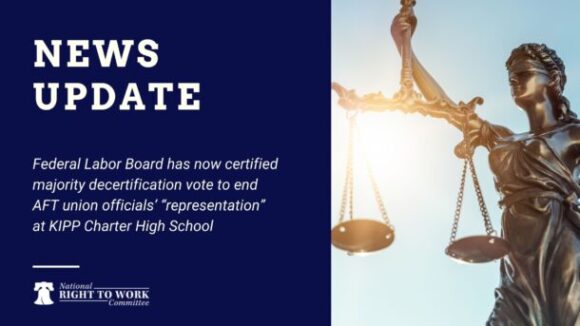Will Team Biden Weaponize Workers’ Pensions?
Big Labor abuse of worker pension and benefit funds as a means of advancing union bosses’ self-aggrandizing policy objectives is a familiar phenomenon.
It was 42 years ago next month that a narrow U.S. Supreme Court majority found, to the shock and indignation of countless Americans, that extortionate threats, property destruction and assaults perpetrated to further “legitimate union objectives” do not constitute extortion as defined by the federal Hobbs Act, and therefore may not be prosecuted under this 1946 statute.
Ever since Enmons was first issued, legal scholars have publicly questioned its reasoning that, if a business owner threatens a potential competitor with physical harm to keep him out of a market, it’s extortion, but if union militants do the same thing to a union-free contractor and/or his employees to deter them from competing for a job, it’s not extortion. In his dissent, Justice William O. Douglas, joined by three other justices, cogently argued that the Hobbs Act was specifically designed NOT to exempt Big Labor thugs from extortion prosecutions.
For years, Right to Work activists have pushed for passage of legislation that would overturn Enmons and ensure that union bosses who orchestrate, incite and/or ratify acts of violence and sabotage against independent business owners and employees can be held accountable for their crimes under the Hobbs Act. One negative consequence of Enmons that Right to Work supporters have emphasized is that it fosters a mentality among unscrupulous union officials that they are generally above the law.
One jarring example of this type of thinking came to light last week in the ongoing extortion trial of Joseph Dougherty, former boss of Philadelphia-based Local 401 of the Ironworkers Union. The judge in this case ruled, before it went to trial, that Dougherty and his cohorts may be federally prosecuted for racketeering despite Enmons because the business employees and owners they allegedly targeted were not unionized. (If the targets had already been subject to union monopoly bargaining, Dougherty et al could not have been similarly charged, the judge readily conceded.)
But Dougherty clearly believes he and other union bosses should have the legal right to harm the property and persons of employees and business people who dare to operate union-free. As evidence that the ex-Local 401 chief approved of the acts of arson, assault and vandalism to which his former paid operatives and militant followers have recently confessed, prosecutors submitted this evidence late last week:
But the prosecution claims the workers did act in his behalf — and it presented this final secretly recorded conversation in which Dougherty had just been informed by phone that one of his men had been acquitted of assault/threats charges in a union-non-union related incident.
“He got lucky there, but that was good because those pigs…there shouldn’t be a crime against people like that,” Dougherty is heard saying. “You should be able to do whatever you want to them and it should be legal.”
(To read the whole story, see the link below.)


Big Labor abuse of worker pension and benefit funds as a means of advancing union bosses’ self-aggrandizing policy objectives is a familiar phenomenon.

What impact does handing a union monopoly power to deal with your employer on matters concerning your pay, benefits, and work rules have on your pay?

Federal Labor Board has now certified majority decertification vote to end AFT union officials’ “representation” at KIPP Charter High School